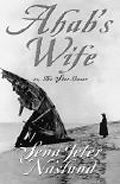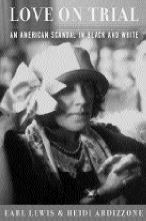AHAB’S WIFE UNA has spent her first pregnancy at her mother’s Kentucky cabin—Ahab is away at sea, of course, busy whaling—and though her labor starts hard, it fails to progress. Her mother rides into the icy night for a doctor, and Una is oblivious with pain when a runaway female slave creeps through the cabin door and into her bed. A gang of bounty hunters bursts in after the runaway but, persuaded by their leader (a dwarf cloaked in wolfskin), they soon depart. The women snuggle beneath the quilts, Una laughing when not gasping with birth pangs. At last the infant Liberty is born, only to die before first light. And dawn brings news of another disaster: Una’s mother has frozen to death in the snow. Una, gazing skyward beside the grave that holds both her mother and her child, wonders if the universe is punishing her, but she rallies. She outfits her new friend for a flight to freedom and sends her North across the floes of the frozen river like Liza in Uncle Tom’s Cabin.
Ahab’s Wife or, The Star-Gazer by Sena Jeter Naslund William Morrow, $28
We’re only on page 13 by this point—and there are 650 to go, profuse in events, literary allusions, and love. For Una, love is the answer. Thus she will never quite understand (although she’ll forgive) the monomaniacal vengeance that her beloved husband later pursues against the White Whale and against the blankness of the existential void. What void? Rapt attention to each moment shows that life is full and glorious.
Naslund takes us back to Una’s childhood in leisurely poetical fashion. Twelve-year-old Una is sent away from her brutal zealot of a father to live with relatives at a lighthouse overlooking the Atlantic, where she learns to love the stars and the sea. These chapters glow with painterly images of windblown landscapes and picturesque vegetarian food, e.g., a “sweet potato gashed richly open” on a plate. How glad I was when Una hit puberty and ditched her warm, wonderful family for a couple of sailors, Kit and Giles. She cuts her hair, dresses like a boy, and secretly follows the guys aboard the whaler they’ve shipped with. Between trysts with them (they quickly see through her disguise) Una gives us a full report on the whaling life, until the ship sinks and the crew is cast adrift. She and her friends survive by eating the flesh of shipmates who succumb, and after their rescue they are haunted by memories of their cannibalism. Giles commits suicide, Kit goes mad, and Una weds the madman.
Una’s eventual second union with Ahab is less convincing. As she wanders the Nantucket dunes during one of her dark, soulful nights, a flinty hand silently leads her to safety before its anonymous owner slips away. Ahab? Must be! Later she hears him wail “Una! Obsession!” into the flames of a house that’s conveniently afire at the moment. Their passion is terrific, but when Ahab gives Una money to buy furniture, readers may feel that their memory of Moby-Dick has been handed ashore dressed in a blouse and skirt.
What Naslund does best is to portray a woman who joyously accepts the universe with the same unstinting ardor with which Ahab roars his everlasting “No!” Una’s bliss is irrepressible, obstreperous, steeping random moments in its wayward shimmer. But the bold feminism so many reviewers praise in our heroine is rather compromised by her tendency to drop her emotional anchor next to every eligible or fatherly male who sails into her waters—first Giles, then Kit, then Captain Fry, Ahab, Isaac Starbuck, Judge Lord, Robben Avalon, and finally Ishmael. Nor is Una particularly scrupulous in ethical quandaries; her moral reflections on deceiving her friend Charlotte are only cathartic rationalizations after the fact. Finally, as a storyteller, she doesn’t measure up to Melville’s narrator. Ishmael is as wholehearted as Una, but half-sure, too, mingling meditation, wonder, affection, and horror in an ironically multiple vision. Una has only one purpose in mind at a time, so although her purposes change like the weather her story achieves merely variety, not ambiguity or true complexity. She just wants (and wants us) to live, love, laugh, and be happy.
Ahab’s Wife will attract fans of popular fiction—a woman at the Northwest Bookfest told Naslund the book “felt comfortable the whole way.” But Naslund seems to be aiming at audiences familiar with the authors she continually evokes: Chaucer, Cervantes, Spenser, Sidney, Shakespeare, Donne, Goethe, Coleridge, Shelley, Byron, Bront묠Keats, Emerson, Fuller, Hawthorne, Douglass, and, of course, Melville. Her novel’s best achievement may be to return readers to its origins.
Judy Lightfoot is a poet and freelance writer who teaches at Lakeside School.








